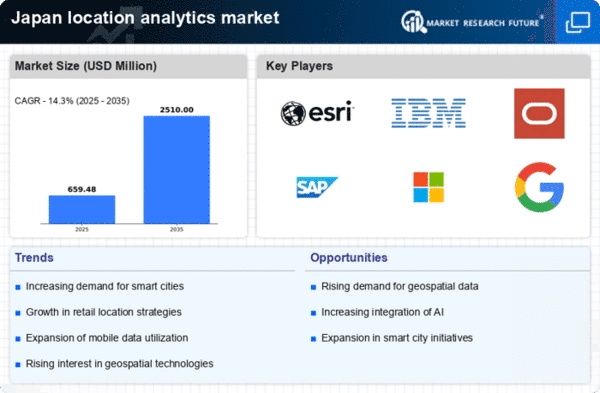Increased Adoption of IoT Technologies
The proliferation of Internet of Things (IoT) technologies in Japan is fostering growth in the location analytics market. As more devices become interconnected, the volume of location-based data generated is increasing exponentially. This influx of data presents opportunities for businesses to gain deeper insights into consumer behavior and operational efficiency. Industries such as transportation, healthcare, and retail are particularly benefiting from the integration of IoT with location analytics. For instance, the transportation sector is utilizing location data to optimize fleet management and reduce operational costs. It is estimated that the IoT market in Japan will reach a valuation of $50 billion by 2026, which could further enhance the capabilities of location analytics. Consequently, the location analytics market is likely to see substantial growth as organizations harness the potential of IoT technologies.
Government Initiatives for Urban Planning
Government initiatives aimed at urban planning and infrastructure development are significantly impacting the location analytics market in Japan. As cities evolve and expand, there is a growing need for data-driven approaches to manage urban growth effectively. The Japanese government has been investing in smart city projects, which leverage location analytics to improve public services, transportation systems, and resource management. Recent reports indicate that the government plans to allocate approximately $10 billion towards smart city initiatives over the next five years. This investment is expected to create a favorable environment for the location analytics market, as public and private sectors collaborate to implement innovative solutions. The integration of location analytics into urban planning processes is likely to enhance the quality of life for residents while driving economic growth.
Rising Demand for Real-Time Data Analysis
The location analytics market in Japan is experiencing a notable surge in demand for real-time data analysis. Businesses across various sectors, including retail and logistics, are increasingly recognizing the value of immediate insights derived from location-based data. This trend is driven by the need for enhanced decision-making capabilities, allowing companies to respond swiftly to market changes. According to recent estimates, the market for real-time analytics is projected to grow at a CAGR of approximately 15% over the next five years. This growth is indicative of a broader shift towards data-driven strategies, where organizations leverage location analytics to optimize operations and improve customer experiences. As a result, The location analytics market is expected to expand significantly, with companies investing in advanced technologies to harness the power of real-time data.
Expansion of E-Commerce and Delivery Services
The rapid expansion of e-commerce and delivery services in Japan is significantly influencing the location analytics market. With the increasing reliance on online shopping, businesses are seeking innovative ways to enhance their logistics and supply chain operations. Location analytics plays a crucial role in optimizing delivery routes, managing inventory, and improving customer satisfaction. Recent data suggests that the e-commerce sector in Japan is expected to reach a valuation of over $200 billion by 2025, further driving the demand for location-based insights. Companies are utilizing location analytics to analyze consumer behavior, identify trends, and tailor their services accordingly. This trend not only enhances operational efficiency but also contributes to the overall growth of the location analytics market, as businesses strive to meet the evolving demands of consumers.
Growing Focus on Customer Experience Enhancement
The location analytics market is increasingly driven by a growing focus on enhancing customer experience in Japan. Businesses are recognizing that understanding customer preferences and behaviors is essential for maintaining a competitive edge. By leveraging location analytics, companies can gain insights into foot traffic patterns, customer demographics, and purchasing behaviors. This information enables businesses to tailor their marketing strategies and improve service delivery. Recent studies indicate that organizations that prioritize customer experience see a 60% increase in customer retention rates. As a result, the location analytics market is likely to benefit from this trend, as more companies invest in tools and technologies that facilitate a deeper understanding of their customers. This focus on customer-centric strategies is expected to propel the growth of the location analytics market in the coming years.
















